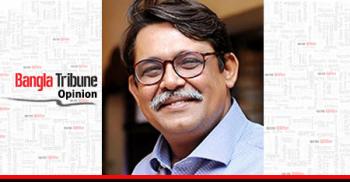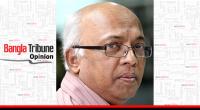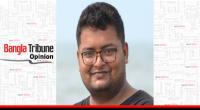 I came across a recent speech by BNP’s acting chief Tarique Rahman on YouTube to mark Nov 7 — the day in 1975 his father, General Ziaur Rahman, emerged as Bangladesh’s strongman stepping over the blood of freedom fighter armed forces officers.
I came across a recent speech by BNP’s acting chief Tarique Rahman on YouTube to mark Nov 7 — the day in 1975 his father, General Ziaur Rahman, emerged as Bangladesh’s strongman stepping over the blood of freedom fighter armed forces officers.
From his secure and comfortable life in London, one wonders how he can “incite” his followers and supporters against the State? How Tarique is allowed by the UK authorities to make such a speech is a question that needs to be answered. Any other host country would not allow a foreign national to make such an instigating speech which is tantamount to an act of treason.
Tarique appealed to the country’s armed forces and civil servants not to obey, what he called “an illegal government’s unlawful activities.” He cited centres where EVMs would be used and manned by the army and said “This is a plot to pit the army against the people .... I appeal to the patriotic armed forces not to get involved with such an illegal process.”
By any standard, these comments tantamount to inciting an illegal uprising against an elected government.
He must know that the first duty of the “patriotic armed forces” is to remain out of politics and work for the government of the day as per the orders they receive. The forces' darkest period started from Aug 15 1975. Ziaur Rahman’s hands became bloody from the time he started random killings of anyone opposed to him. Most of them were brave freedom fighters.
It was due to his mishandling of the armed forces by unilateral sackings, postings and dismissal, that his close officers staged the 1/11 takeover with a civilian face led by Fakhruddin Ahmed as the chief of the caretaker regime.
On the other hand, the Awami League of Sheikh Hasina has turned the armed forces into a modern force. She has increased their benefits manifold with more and more soldiers joining the UN Peacekeeping Mission.
And he (Tarique) talks about protecting our independence and upholding the spirit of the Independence War. How will he do it by making extraordinary special friends with Pakistan, the rulers of which killed innocent Bengalis in thousands in 1971? By letting terrorists use our soil against our tested friend India?
It was his father, Ziaur Rahman, who killed freedom fighters and rehabilitated Pakistani collaborators including Golam Azam, who returned to Bangladesh to re-establish his dreams of making Bangladesh a Pakistani protectorate. His mother, former prime minister Khaleda Zia went a step further by making war criminals members of the Cabinet between 2001 and 2006.
Tarique Rahman, speaking in his favourite venue the Royal Regency hall in London, told his supporters that the upcoming election was part of their campaign to “restore democracy.“ How can he restore democracy when his father killed democracy by killing Bangabandhu and he along with his mother killed the concept of a caretaker government in 2006 by appointing BNP-member President Abdur Rahman Biswas as its chief? Tarqiue can no more call the government “illegitimate” after his BNP sat for a dialogue accepting Sheikh Hasina as the country’s elected prime minister.
The election was to “protect freedom of expression and to ensure a free media by saving it from digital media.”
During the rule of his late father Ziaur Rahman between 1975 and 1981 and that of his mother, Khaleda Zia, between 2001 and 2006, what was the situation relating to those two issues he talks about now? He was a major force himself of the regime with ‘Hawa Bhaban’ as the centre of the government.
The press was under strict control during General Zia’s regime and anyone who spoke against his whims either lost their jobs or got punished one way or the other. Within the armed forces, officers and soldiers were 'eliminated', as his regime did with freedom fighter Col Abu Taher. Even, scribes like me, who were working for foreign press, were given veiled warnings if a report did not go along their drawn lines of thoughts in the name of “protecting national interest” or the country’s “image abroad.”
During the 2001-2006 Khaleda Zia administration, it was a controlled-media with a civilian cover. I was personally reprimanded several times, especially when I reported atrocities on Hindus whom voted for BNP's arch rival Awami League led by Sheikh Hasina.
A Bangla daily became a threat to journalists as whoever it named as anti-BNP, would be taken into custody or subjected to intimidations.
The other issue Tarrique picked up was the issue of killing of the Bangladeshi girl Felani by the Indian Border Security Force (BSF).
Her body was pictured hanging from a barbed wire fence which drew widespread criticism. It is not new that BSF has killed people illegally crossing border, mostly cattle thieves/smugglers. It is Sheikh Hasina who has made India stop such killings and the case of Felani murder ended with a court verdict.
Like his father, Tarique Rahman and his mother, now in jail after being convicted in two graft cases, used the anti-India card till date in public, but sources have confirmed this writer that great efforts were made before and even now to make friends with Delhi albeit not in public view. Will he pick up new issues to dampen the currently warm bilateral ties with India?
Before the young politician, who is now on the run from law and conspired to kill Sheikh Hasina along with the Awami League leadership through Aug 21, 2004 grenade attack, can answer all the above questions, he should not befool the electorate.
He must face the court to prove his innocence instead of instigating sensitive organisations like the armed forces and the civil administration in his bid to capture state power.
He has asked Bangladeshis to turn the ballot into a weapon by joining election and turn the polling centres into war zones.
Tarique Rahman should think that other than fanatics and those with low intellect levels, whether any sane person would like to see him back in power or not, with so many unanswered questions.
Nadeem Qadir is the Roving Editor at The Asian Age and a UN Dag Hammarskjöld fellow.


